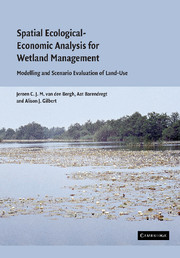 Spatial Ecological-Economic Analysis for Wetland Management
Spatial Ecological-Economic Analysis for Wetland Management Book contents
- Frontmatter
- Contents
- List of figures
- List of tables
- Preface
- 1 Introduction
- 2 Wetlands and science
- 3 Integrated modelling and assessment
- 4 Theoretical framework and method of integrated study
- 5 The Vecht area: history, problems and policy
- 6 Development scenarios for the Vecht area
- 7 The spatial–ecological model: hydrology and ecology
- 8 The spatial–economic model: agriculture, nature conservation and outdoor recreation
- 9 Performance indicators for the evaluation
- 10 Evaluation of the scenarios
- 11 Conclusions: policy and research implications
- References
- Index
3 - Integrated modelling and assessment
Published online by Cambridge University Press: 24 November 2009
- Frontmatter
- Contents
- List of figures
- List of tables
- Preface
- 1 Introduction
- 2 Wetlands and science
- 3 Integrated modelling and assessment
- 4 Theoretical framework and method of integrated study
- 5 The Vecht area: history, problems and policy
- 6 Development scenarios for the Vecht area
- 7 The spatial–ecological model: hydrology and ecology
- 8 The spatial–economic model: agriculture, nature conservation and outdoor recreation
- 9 Performance indicators for the evaluation
- 10 Evaluation of the scenarios
- 11 Conclusions: policy and research implications
- References
- Index
Summary
Introduction
Integrated ecological–economic modelling has been practised since at least the late 1960s. Russell (1995) presents an interesting ex post evaluation of the early work undertaken at Resources for the Future. He is modestly optimistic about the feasibility of the formal linking of economic and ecological models but argues that significant financial and human resource investments are required to improve the quality of integrated modelling. Such investments have been undertaken in some areas of application, notably relating to the enhanced greenhouse effect and climate change, but are less evident in the area of ecosystem modelling. The latter has seen mainly ad hoc efforts at integrated modelling, and certainly less interaction and competition among different research teams.
The types of question addressed by integrated models have changed over time. The early exercises were oriented towards the spatial dispersal of discharges of pollutants to air and water and the subsequent impacts on environmental quality and ecosystems. Later efforts have been aimed at a range of issues such as the modelling and testing of:
the stability and resilience of complex systems (Holling, 1978; Walters, 1986);
the impact of multiple stress factors (Braat and van Lierop, 1987);
the impact of simultaneous ecological and economic shocks (e.g. floods and droughts) (Moreira et al., 2001; Rietkerk et al., 2000);
the relationship between development, resources and environment (sustainable development) (Arntzen, 1989);
the impact of nature policy and management (Chapin et al., 2000; Pimm and Lawton, 1998);
the influence of land use on environmental quality and landscape (this study);
the influence of hydrological management in wetlands (Maltby et al., 1996);
the impact of acid rain on vegetation and lakes (Alcamo et al., 1990); and
the impact of global environmental processes (deforestation, biogeochemical cycles (various IPCC (Intergovernmental Panel on Climate Change) studies).
[…]
- Type
- Chapter
- Information
- Spatial Ecological-Economic Analysis for Wetland ManagementModelling and Scenario Evaluation of Land Use, pp. 55 - 82Publisher: Cambridge University PressPrint publication year: 2004


